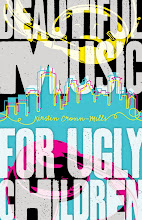
In our house, we like Rick Riordan. My husband and son devoured the PERCY JACKSON series this winter, and I finally finished it late this spring. When we saw his latest series, THE RED PYRAMID, we were all over it--woo hoo!
Last week it was finally my turn with the new book. By page 7 I know this brother and sister do not look alike. Carter takes after his dad, who is African-American, and Sadie takes after her mother, who was white. Here's Riordan's description of Julius, their dad: "He has dark brown skin like mine, piercing brown eyes, a bald head, and a goatee, so he looks like a buff evil scientist" (3). Carter also dresses like his dad (business-like but stylish, always dress clothes). Sadie, on the other hand, looks like this: ". . . she takes after our mom, who was white, so Sadie's skin is much lighter than mine. She has straight caramel-colored hair, not exactly blond but not brown, which she usually dyes with streaks of bright colors . . . [and] her eyes are blue. I'm serious. BLUE eyes, just like our mom's" (7).
Why is this important? You'll see.
I'm reading away, lost in the adventures, and we get to page 373, where Carter is practicing with his sword on a back-porch thingy on his RV. People are looking at him, because he's on the interstate and traveling very fast, so he makes this comment: "Once in a while we'd pass a rancher's truck or a family SUV, and the driver would get wide-eyed when he saw me: a black kid swinging a sword around on the back of an RV. I'd just smile and wave . . . ."
Wha?
By this point, I'd totally forgotten Carter was black, so the sentence snapped me back to reality. And I was embarrassed, because I'd forgotten that fact. Then I had to ponder WHY I'd forgotten it. I came up with a few reasons:
**it didn't matter to the story
**I didn't think fourteen-year-old black guys should be dressed in dress clothes while going on adventures and playing with swords on the back of RVs
**another reason I'm unaware of
I have no idea which of those reasons is the predominant answer. Maybe all of them, maybe none of them. In my head, when I was imagining Carter and his sword, I saw a kid that sort of looked like Harry Potter. Got a little cultural bias there, Kirstin?
In some ways, I go with reason #1, because Riordan doesn't make it significant that the kids are biracial (or I missed it, which is possible, because I was so absorbed and reading fast). The cover gives no real clues, either. If you look at the book's cover, the kids are turned away from the reader, plus the cover colors are not realistic--it's mostly golds and browns (though their hair is different from each other's). Still, Riordan *told* me the kids were biracial. My brain just chose to impose whiteness on them--at least on Carter, anyway.
Does this make me bad? Probably not. Does this make me a product of my white Midwestern culture? Yes. I asked Shae if he knew what color Carter Kane was, and he said no, he didn't notice. When I told him Carter had dark skin and Sadie had light skin, his eyes got wide. His comment: "I saw him as no color," which means white, but it also means he just took him in, and his skin color didn't matter to what Carter was doing. That's all right.
One last question: how would those kids appear to readers of color? Would they switch them out as white? I bet not.
This is something to think about.






Good for you for thinking about these questions and posting them here! I used to think that by not noticing (real-life) people's skin color I was being the opposite of racist. Over the years, though, I've decided that while not thinking about skin color at all is better than being racist, it's not as good as being aware (and appreciative) of people's different backgrounds. I'm thinking this must apply to fictional characters, too. But maybe it's natural that we picture people the way we ourselves look, or the way most of the people around us look. Maybe the corollary is: When people of color read about white characters, do they picture them with their own skin color, or as white?
ReplyDeleteThat's a very excellent question. I'd bet, if we don't know the skin color of a character, we tend to impose our own. It would make sense. BUT--I say that as a white person and as a person of the majority culture. Maybe a person of color would read the *culture* of the character and assume skin color based on that. I wonder.
ReplyDelete